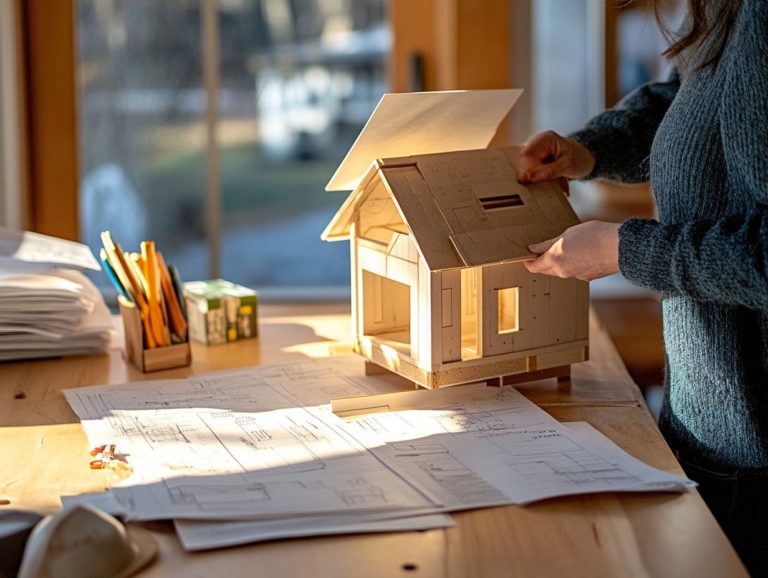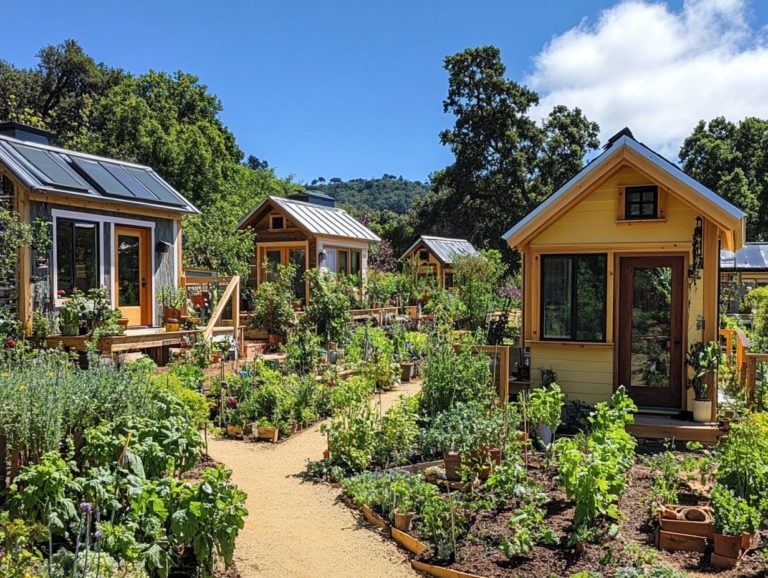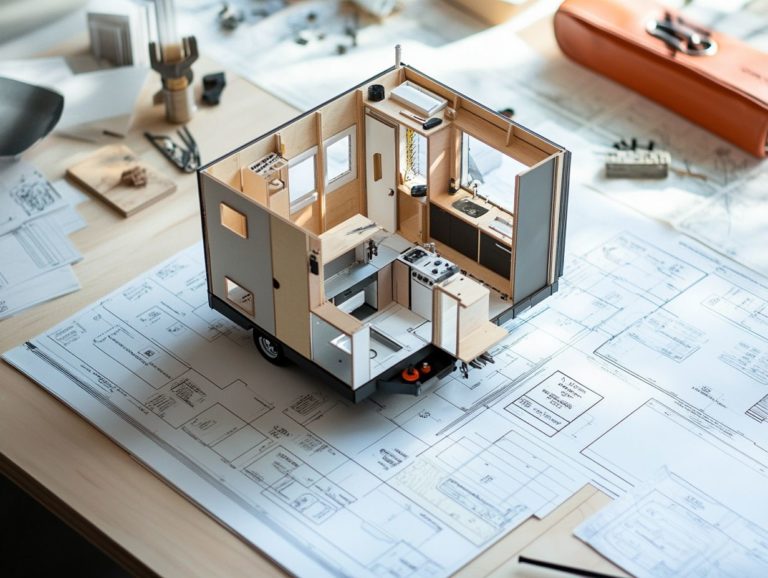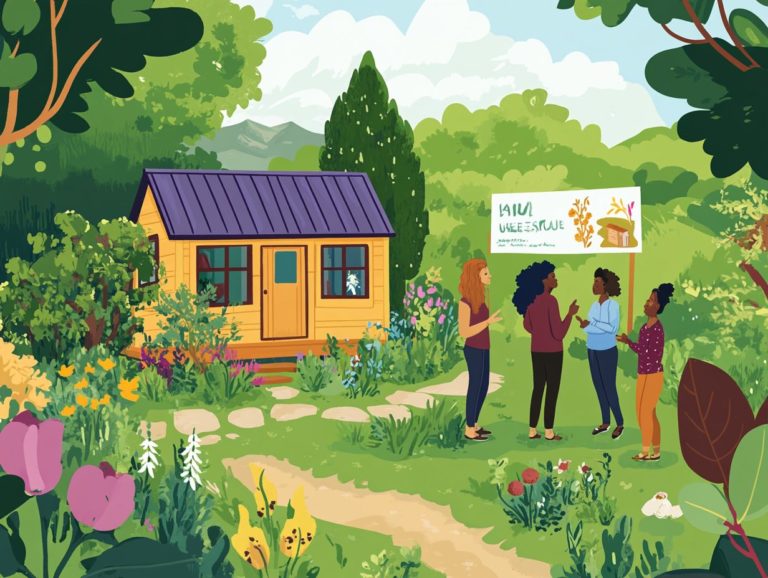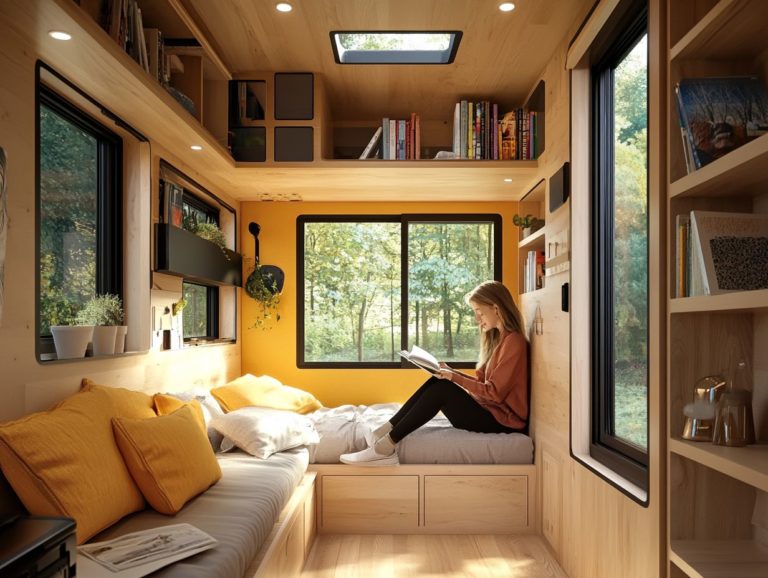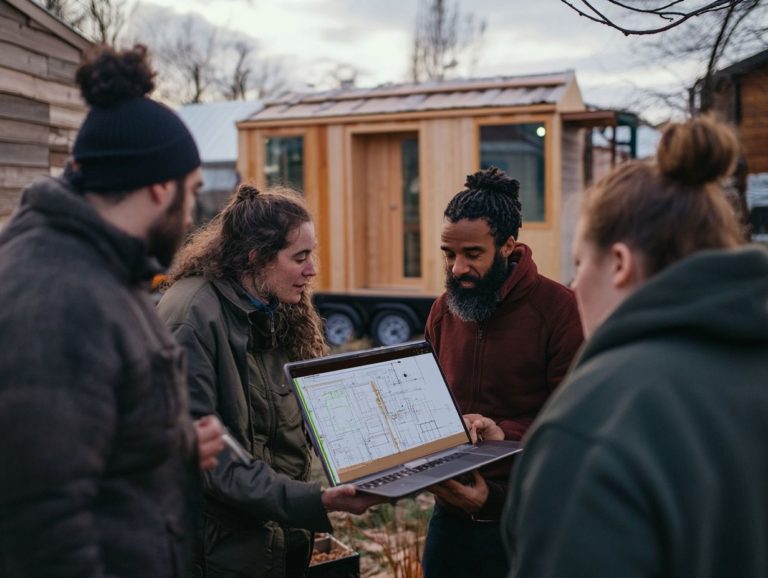Tiny House Communities: Legal Rights and Duties
Tiny house communities are becoming popular for those seeking a blend of minimalist living, sustainability, and strong social ties.
In these communities, residents can learn about their legal rights and responsibilities. This article explores tiny house living, covering property ownership, community regulations, and zoning law challenges.
Living in these close-knit environments has many benefits. Tiny houses might represent the future of affordable living!
Contents [hide]
- Key Takeaways:
- Understanding Tiny House Communities
- Legal Rights of Tiny House Community Residents
- Duties of Tiny House Community Residents
- Navigating Zoning Laws and Regulations
- Benefits of Living in a Tiny House Community
- Frequently Asked Questions
- Can I legally live in a tiny house community?
- What are the legal rights of tiny house community residents?
- Do I have to pay property taxes if I live in a tiny house community?
- Are there any legal duties that come with living in a tiny house community?
- Can tiny house communities be evicted like traditional housing communities?
- Do I have to own my tiny house to live in a tiny house community?
Key Takeaways:
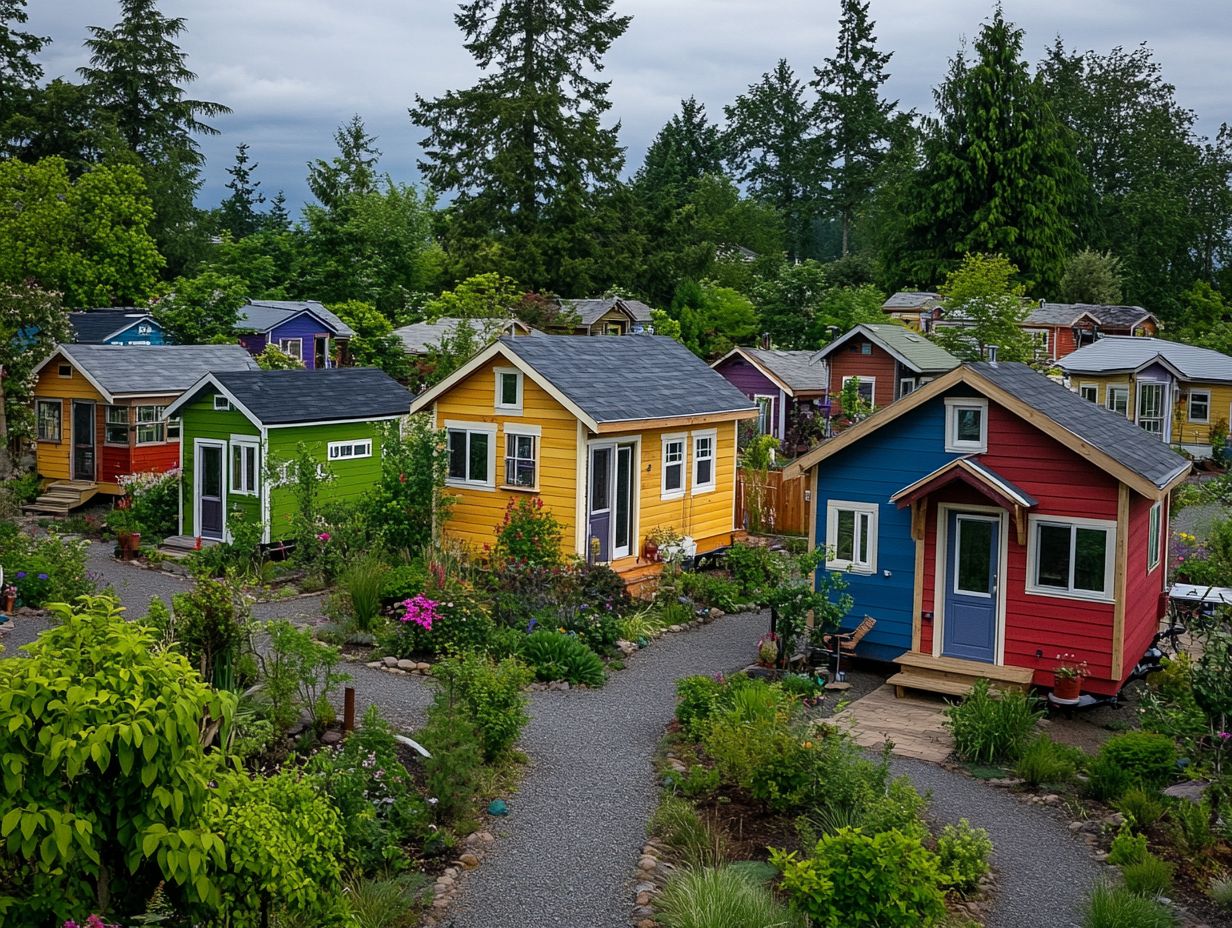
- Tiny House Communities offer a sustainable lifestyle with community support.
- Residents have legal rights, including property ownership and community rule-making.
- Alongside benefits, residents have duties to maintain the community.
Understanding Tiny House Communities
Tiny house communities reflect the growing trend of downsizing living spaces into charming small homes. This choice creates an atmosphere of shared values and sustainability.
These communities provide solutions for housing affordability while promoting a lifestyle rooted in minimalism, environmental awareness, and mutual support.
Tiny houses can be on wheels or foundations, catering to various preferences and legal needs.
What are Tiny House Communities?
Tiny house communities are intentional neighborhoods where you can live in compact homes while sharing resources. This lifestyle enhances sustainability and fosters strong community ties.
These living arrangements align with the principles of minimalism, environmental awareness, and financial freedom. Residents often collaborate on projects like community gardens and social events, building a sense of belonging.
Common spaces like kitchens and lounges promote resource sharing. Enjoy lower living costs and a decluttered lifestyle that prioritizes relationships over possessions. This approach not only improves your quality of life but also supports a sustainable planet.
Legal Rights of Tiny House Community Residents
Knowing the legal rights of tiny house residents is essential. Laws and regulations vary significantly based on location and can affect property ownership and housing options.
It’s crucial to be aware of local zoning laws and building codes. Understanding these guidelines helps you advocate for your rights and make informed living choices.
Property Ownership and Rights
Property ownership in tiny house communities can be quite intricate, varying significantly based on local laws and regulations surrounding tiny homes.
If you’re contemplating living in a tiny house, grasping the different forms of property ownership is essential. Your options typically include leasing land in a designated community, renting a space, or outright purchasing land. To navigate these choices effectively, consider exploring tiny house legal resources you should know, as each option carries its own legal nuances and rights that can greatly affect your living experience.
For instance, leasing might offer you the flexibility you desire, but it can also introduce uncertainties regarding contract terms. On the other hand, owning land provides a sense of permanence, yet it brings responsibilities like taxes and following local rules about land use.
Think carefully about these factors to find the right fit for your lifestyle and aspirations.
Community Rules and Regulations
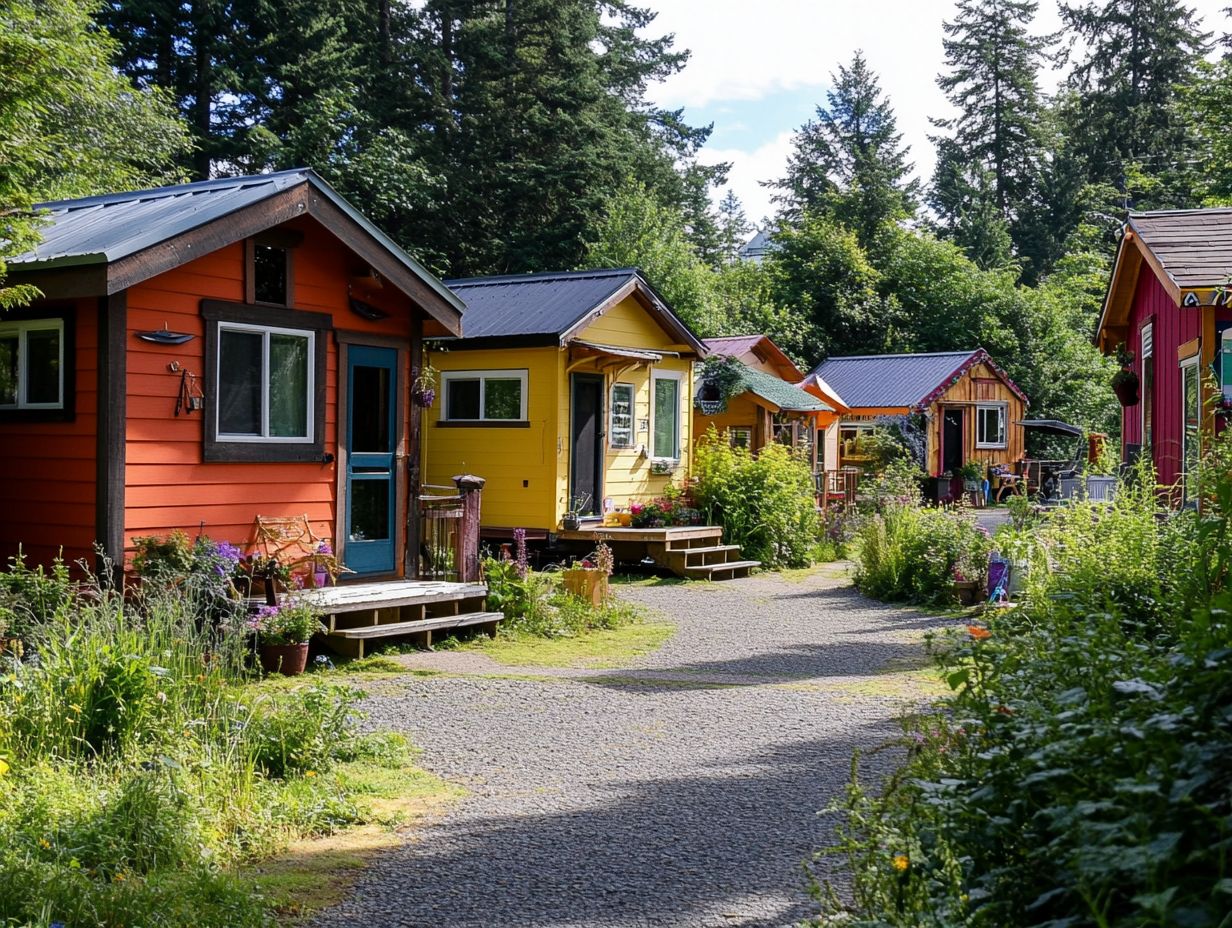
Community rules help create a peaceful and safe living environment while ensuring compliance with local building codes and zoning laws.
As a resident, you’ll need to adhere to specific guidelines, such as noise ordinances that limit loud activities during certain hours, fostering peace among your neighbors. Regular maintenance is also part of the deal; you re expected to keep your tiny home and its surroundings tidy, enhancing the community’s aesthetic appeal.
Guest policies will likely dictate how long visitors can stay, ensuring that the tight-knit nature of the community remains intact. If these rules are violated, you might face warnings or even expulsion, underscoring the importance of cooperation in upholding the integrity of communal living.
These rules support tiny house standards and encourage everyone to take responsibility, enhancing the collective experience of living in such a unique community.
Duties of Tiny House Community Residents
Your role is key in maintaining a welcoming and sustainable community for everyone.
Beyond the upkeep of your own tiny home, you are encouraged to engage in community activities and contribute to shared spaces and resources. These responsibilities not only foster a sense of belonging but also inspire mutual support among residents, enriching your overall experience of tiny house living.
Maintaining the Community
To keep our tiny house community thriving, everyone needs to pitch in to ensure that shared spaces remain clean, functional, and welcoming.
This collective responsibility encompasses various aspects, such as landscaping. You and your fellow residents can unite to plant native flora that enhances the area’s beauty and supports local wildlife. Regular upkeep of communal facilities, including kitchens and recreational areas, is just as vital. By taking turns cleaning and organizing these spaces, you contribute to a shared sense of ownership that everyone appreciates.
Planning and hosting community events is another fantastic way to foster camaraderie and strengthen bonds, creating a vibrant atmosphere. When you actively participate in these initiatives, the entire community reaps the benefits, cultivating an environment that enhances social interaction and nurtures the collaborative spirit of tiny house living.
Contributing to Community Expenses
Contributing to community expenses is essential for the sustainability of tiny house communities, where residents frequently share the costs of utilities, maintenance, and communal amenities.
This collaborative approach fosters a sense of belonging and ensures that vital services are consistently maintained and enhanced. By working together, you can effectively budget for shared expenses like water and electricity bills, relieving any undue financial strain on individuals.
Financial transparency is crucial in this process; when you engage in open communication about costs and contributions, it builds trust among neighbors.
Recognizing how your financial contributions directly support the community’s infrastructure and services creates a more harmonious living environment and gives you the power to take an active role in enhancing the quality of life within your community.
Navigating Zoning Laws and Regulations
Navigating the complicated zoning laws and regulations poses one of the most significant challenges for tiny house residents. These laws dictate not only where tiny houses can be situated but also how they can be utilized, directly impacting their affordable living and accessibility.
It s essential for you to grasp local zoning regulations to pinpoint tiny house-friendly areas and steer clear of legal pitfalls when setting up your tiny home, whether on wheels or a fixed foundation.
Getting involved in advocacy efforts within the Tiny House Movement can help influence policy changes that support the rising popularity of these alternative living arrangements.
Challenges and Solutions
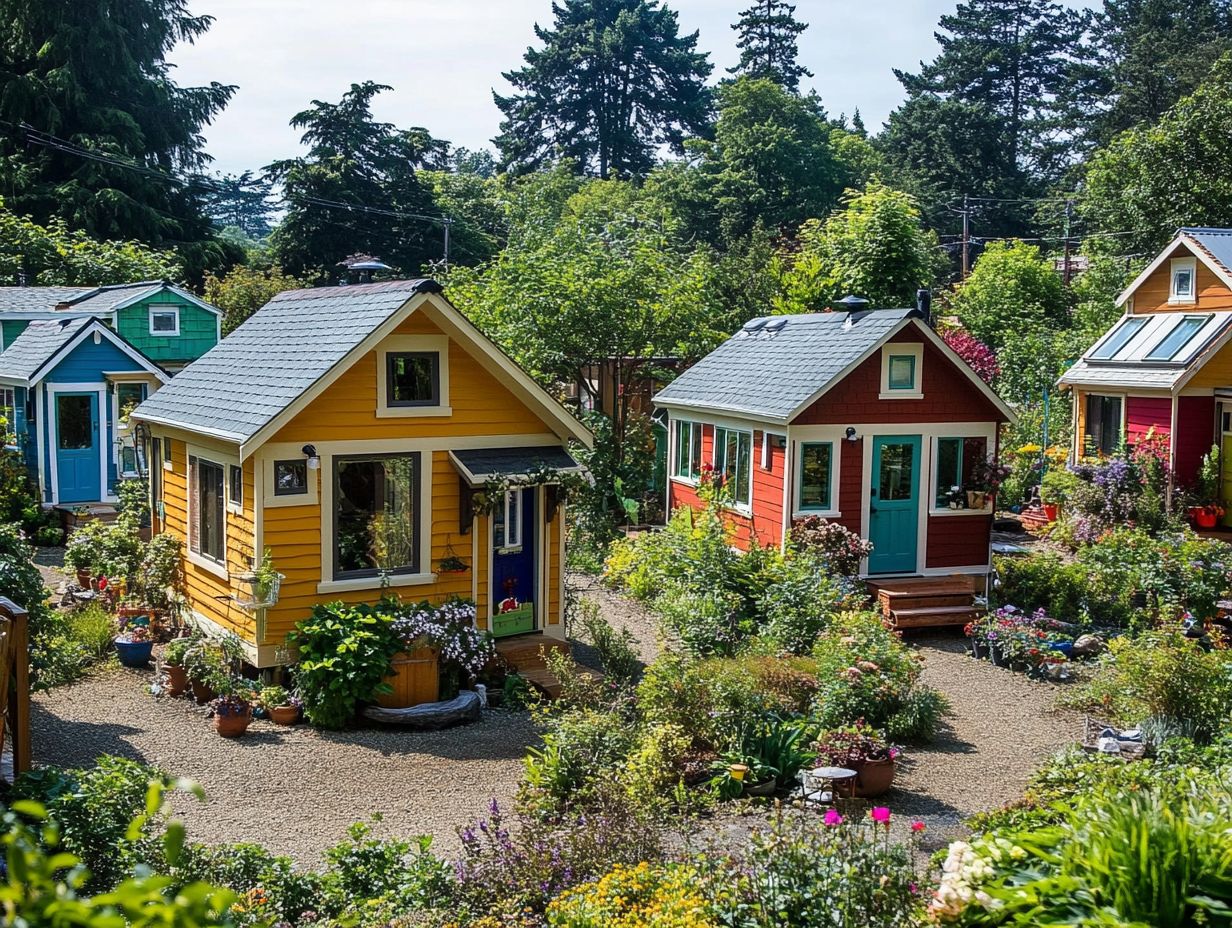
As a tiny house resident, you may encounter a host of challenges related to zoning laws. These include restrictions on minimum square footage, regulations concerning the placement of tiny homes on wheels, and the need to comply with local building codes and safety standards.
These obstacles can be frustrating when you’re striving for a simpler, more sustainable lifestyle—a key component of the Tiny House Movement. Many local governments adhere to traditional zoning regulations, which can be particularly challenging in states like California and Florida that simply don’t recognize the unique advantages of tiny living. For those seeking guidance, tiny house legal assistance can provide valuable support.
To navigate this complex landscape, you can draw inspiration from tiny house advocates who have successfully championed community advocacy efforts. By raising awareness about the myriad benefits of tiny homes and collaborating closely with local officials, they’ve worked to amend outdated policies regarding tiny house design and sales, as highlighted in tiny house communities: what makes them special.
Engaging with like-minded individuals in your community, organizing workshops on tiny house plans, and making your presence felt at town hall meetings can help create a platform for meaningful discussion. This proactive approach may pave the way for more flexible regulations that support affordable housing solutions, including small units that can be added to a property for extra living space. For those considering this lifestyle, exploring tiny house community living: pros and cons can make your tiny living dream a reality.
Imagine living simply and sustainably! Now is the time to engage with your local officials to create change!
Benefits of Living in a Tiny House Community
Living in a tiny house community presents you with a wealth of benefits, such as better sustainability through smart tiny house designs and renewable energy like solar panels. You also enjoy significant cost savings that allow you to invest in personal aspirations. This is often realized through the flexibility of tiny homes for sale, making it easier to build your own tiny house foundation, which attracts many tiny house builders and prospective homeowners.
Moreover, there is a nurturing social atmosphere found in tiny house communities across New Jersey and Texas that cultivates connections among residents. Embracing a minimalist lifestyle inspired by the principles of the Tiny House Movement—a movement focused on living simply in smaller homes—allows for a more efficient use of resources. However, it’s important to be aware of tiny house HOA rules that may affect your living situation.
The communal elements of these communities encourage sharing and collaboration, essential for the success of tiny house living in places like Burleigh County and Sarasota County. To ensure a harmonious environment, it’s important to be aware of the tiny house community rules you should know, ultimately enriching your living experience.
You ll also discover financial benefits with lower living costs that are particularly appealing in high-cost areas like New York and California, making the allure of tiny house living increasingly attractive for individuals and families alike who find it easier to adopt tiny homes for sale.
Community Support and Sustainability
Community support is essential for the sustainability of tiny house living. You and your neighbors often collaborate to share resources and foster practices that promote environmental stewardship through thoughtful engagement with tiny home builders and local regulations.
Engaging in shared gardening projects, often featured in tiny house communities in Georgia and Alaska, allows you to cultivate fresh produce while strengthening connections that reinforce social bonds. When you participate in collectively initiated recycling programs that follow local building rules, you contribute to efficient waste management, reducing landfill contributions and encouraging thoughtful consumption. To ensure compliance, it’s important to understand tiny house laws that every owner should know.
Many tiny house communities, including yours, are adopting renewable energy initiatives like solar panel installations. These offer both economic benefits and a shared commitment to lowering carbon footprints. This synergy within the community not only enhances your individual lifestyle but also highlights the transformative power of social support. For new residents, exploring tiny house communities: tips for new residents is a vital component for sustaining tiny house living and nurturing lasting sustainable practices.
Cost Savings and Lifestyle Benefits
One of the standout benefits of tiny house living is the remarkable potential for cost savings. This gives you the freedom to channel your finances into experiences that can be enhanced through tiny house living, especially in places like Pima County and Hawaii, and personal aspirations instead of hefty housing costs.
By choosing a smaller footprint, a direct result of adopting tiny house plans, you ll likely enjoy reduced mortgage payments that can be significantly lower in tiny house communities. This can surprisingly free up a significant portion of your monthly income.
Lower utility bills that decrease with the use of tiny house design principles are another enticing perk, as tiny homes generally require less energy for heating and cooling, leading to noteworthy savings over time. With minimal maintenance costs that are lower compared to traditional homes associated with these homes, you’ll have fewer worries and more time to savor life’s moments.
The flexibility of tiny homes for sale offers you a lifestyle rooted in mobility. Tiny house residents experience this when living in a community setting, enabling you to travel and explore while still enjoying your cozy living space. For more insights, check out these tips and tricks for tiny house community living.
Ultimately, this approach to living cultivates a sense of simplicity that encapsulates the essence of the tiny house lifestyle and mindfulness that encourages a deeper connection with your community and environment, allowing you to focus on what truly matters in life.
Frequently Asked Questions
Can I legally live in a tiny house community?
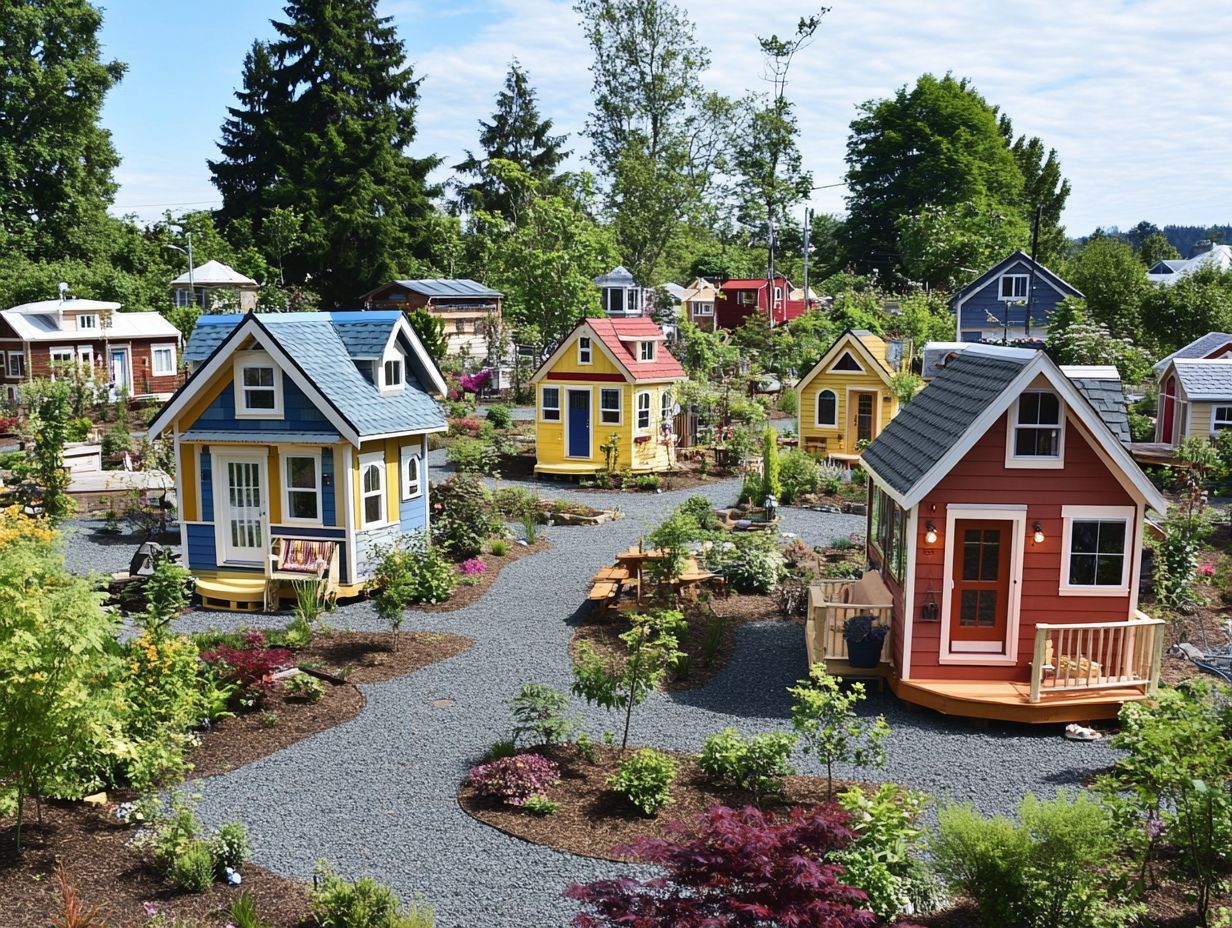
Yes, as long as the community is legally recognized and the tiny houses meet all necessary building codes and zoning regulations.
In conclusion, living in a tiny house community offers numerous benefits, including financial savings, a supportive environment, and a simpler lifestyle. Embracing this way of life allows you to focus on what truly matters while fostering connections with others, as explored in understanding the dynamics of tiny house communities.
What are the legal rights of tiny house community residents?
Residents of a tiny house community have the right to a safe living space, just like anyone else. They can participate in decisions about community rules.
Do I have to pay property taxes if I live in a tiny house community?
Whether you pay property taxes depends on community rules. Some residents might pay a part of the taxes through rent, while others in a recreational vehicle park may be exempt.
Are there any legal duties that come with living in a tiny house community?
Residents must follow community rules, which include maintaining their homes and adhering to safety guidelines. They should respect their neighbors to foster a friendly environment.
Can tiny house communities be evicted like traditional housing communities?
Yes, residents can be evicted for breaking rules or failing to pay fees. The eviction process may differ based on how the community is legally classified.
Do I have to own my tiny house to live in a tiny house community?
No, many communities allow you to rent a tiny house. Some even let residents build their own homes within certain guidelines.

